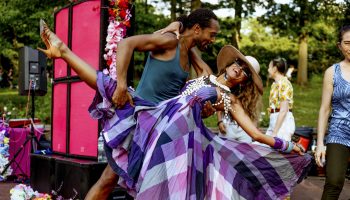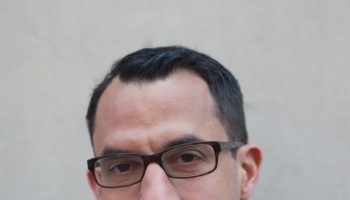
In a computer file named “poem ideas,” Jim Daniels transcribes phrases, images and concepts from the 3-by-5-inch notecards he keeps on his person and by his bedside table. The reminders, very brief notes, “operate more like memory triggers,” Daniels said. One of the items simply reads, “Prostitutes on playground swings.”
“This is typical of my notes, in that there is some juxtaposition or tension that catches my attention,” Daniels said. “Since I do films too, I often think in terms of visual imagery even more than I did earlier in my career. … The first real poem I wrote in high school juxtaposed the names of liquors with the names of candy in the store I worked at. I’m always looking for things that on the surface seem unrelated, to find the relationship. Which, I suppose, is the very basis for metaphor.”
Another, tamer topic inside Daniels’ idea file is, “The accident of the Stone Poneys vs. the Rolling Stones” — a brief summary of when his mother mistakenly bought him a Stone Poneys record instead of one by the Rolling Stones. Daniels imagines the poem to “focus on adolescence and tension with parents trying to find a way to reach their kids.” It wasn’t the Stones 45 he was hoping for, but luckily the Linda Ronstadt-fronted Stone Poneys album turned out to be an overall valuable purchase.
Fresh from co-editing the anthology, RESPECT: Poetry on the Music of Detroit, and partial to selecting the subject of his Brown Bag lectures according to his “own obsessions and enthusiasms as a writer,” the Week Eight poet-in-residence will offer his Brown Bag craft talk, “The Poetry of Music, the Music of Poetry,” at 12:15 p.m. Tuesday, August 13 on the porch of the Literary Arts Center at Alumni Hall.
Daniels, who is most recently the author of the poetry collections The Middle Ages and Street Calligraphy, described his craft talk as “an examination of a couple of samples — poems and song lyrics — that deal with political material and the tension between the relative popularity of contemporary music and the relative obscurity of contemporary poetry.”
Growing up in Detroit meant that he was surrounded by “some of the best music in the world,” and Daniels said he first encountered the poetry world “more out of an interest in rock ’n’ roll than poetry.”
“Poetry, as it was taught to me, tended to be disconnected from my life, while music was everything,” he said.
Although his lecture will focus on the modern landscape of poetry as music, and vice versa — Bob Dylan winning, controversially, the 2016 Nobel Prize for Literature, for example — Daniels acknowledges that all poetry “relies on musical devices” to make meaning within the language they contain. His is a philosophy also claimed by his sonically inclined fellow poet Abraham Smith, a Week Five poet-in-residence who taught a workshop on performing poetry.
“It’s interesting that technology has, in some ways, returned poetry to its origins by making the performances of poetry more accessible online,” Daniels said. “The printed page took away some of that, but I see it coming back more and more.”
With roots in the Rolling Stones and the Detroit music of his childhood, Daniels will link the entwined relationship of poetry and music to his life. Teaching a week-long workshop at the Chautauqua Writers’ Center titled “Writing Lives, Writing Poems,” Daniels cites Jack Gilbert’s short poem, “Poetry is a Kind of Lying” — which concludes with a stanza that reads, “Degas said he didn’t paint / what he saw, but what / would enable them to see / the thing he had.” — as an emotional guide for writing personal and precise poems.
“I write poetry and fiction, but not much nonfiction because I like to take details from a personal reality and use them in new ways — fictionalizing them to get at an emotional truth of some kind without worrying about what ‘really’ happened,” Daniels said. “Poetry is also a way of preserving memory, which I’m also interested in, and reexamining the past through the lens of the present — the past is always changing based on who we are becoming. It affects how we look back to help us look forward.”





